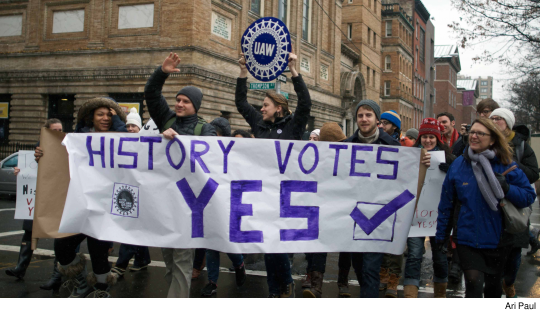 |
After eight years of intransigence from the New York University administration, the Graduate Student Organizing Committee (GSOC) won a December unionization election among the school’s graduate employees by a vote of 620 to 10. The union victory could mark the start of a new era for private university graduate unions, which have faced legal obstacles in recent years.
GSOC was the legally recognized bargaining agent for NYU’s graduate assistants from 2000 to 2005, and in 2002 had negotiated a contract that increased stipends and established a health insurance plan. But under President George W. Bush in 2004, the National Labor Relations Board (NLRB) reversed its earlier stance: in a case at Brown University, it held that graduate students’ paid work as instructors was a form of training, not employment. Graduate employees, the NLRB then concluded, had no legal right to unionize.
NYU then shifted to a hard-line anti-union position, refusing to negotiate a new contract even in the face of a 2005-06 graduate employee strike. It shifted its stance only this fall.
Seizing Opportunity
On December 10, GSOC activist Christy Thornton stood with fellow history department graduate employees as they waited to cast their ballots. Thornton told Clarion that a confluence of factors had pressured the administration to agree to a new union vote. The announcement last summer that NYU president John Sexton would depart over scandals involving excessive pay and privileges for administrators had damaged NYU’s image, Thornton said, and this encouraged the university to seek the high road in the organizing struggle rather than maintain an anti-union position that also hurt its public relations.
Another key factor, Thornton noted, was action by a lower division of the NLRB that makes it likely the national body will overturn the Brown decision in the future. Part of the NYU-GSOC agreement on holding the recent vote included the GSOC’s withdrawal of its petition to the NLRB.
“The administration didn’t want to look bad,” Thornton said. “It was clear we were going to win in the NLRB. They wanted to take control of the narrative.”
Julie Kushner, regional director of United Auto Workers (UAW) Region 9A (to which GSOC belongs), noted that thanks to constant student organizing, the administration was pressured by calls from several mayoral candidates for NYU to agree to a recognition vote.
“They organize every semester, demonstrating majority support,” Kushner said. “The administration decided it was time to listen to the students and the community. I hope this becomes a model. This is a great example of how you can vote for a union outside the NLRB.”
In negotiating the terms of a recognition vote, GSOC held out against concessions that management had initially sought. Though NYU wanted a reduction in the size of the bargaining unit, the final agreement “expands the unit beyond the number of classifications covered under the previous contract that ended in 2005,” the GSOC announced. The administration agreed to remain neutral during the unionization vote, and gave up on pressing the GSOC to agree to a moratorium on organizing NYU’s those research assistants (RAs) not yet included in the 1200-person bargaining unit.
The union is confident that NYU and the GSOC’s ability to work out an agreement on the December vote will be the basis for a better climate of future contract negotiations.
“It will help the dialogue at the bargaining table, without the baggage of a fierce anti-union campaign,” Kushner said. She noted that GSOC’s previous contract at NYU included important protections for benefits and stipends, and said the union looked forward to building on that success.
Positive Precedent
Andrew Ross, president of NYU’s branch of the American Association of University Professors, said that he hopes a union at another private university will pursue an NLRB petition that will overturn the board’s 2004 decision in the case at Brown. GSOC’s new success at NYU will boost organizing at other campuses, Ross said, by providing a working model of positive graduate labor relations.
“It will be a precedent for other unions to do the same,” Ross told Clarion. “They’d say to their administrations, ‘Look, NYU’s done this, there’s no reason you can’t.’”
Ross believes that the administration’s anti-union energy began to wane as the result of the broad negative reaction to its conflicts with the GSOC since 2005. Civil disobedience in support of GSOC resulted in dozens of arrests, including several members of the PSC. “They earned a lot of disrespect from faculty, both at NYU and beyond,” Ross noted. As a result, he said, “They lost of lot of the appetite for fighting over the years.”

